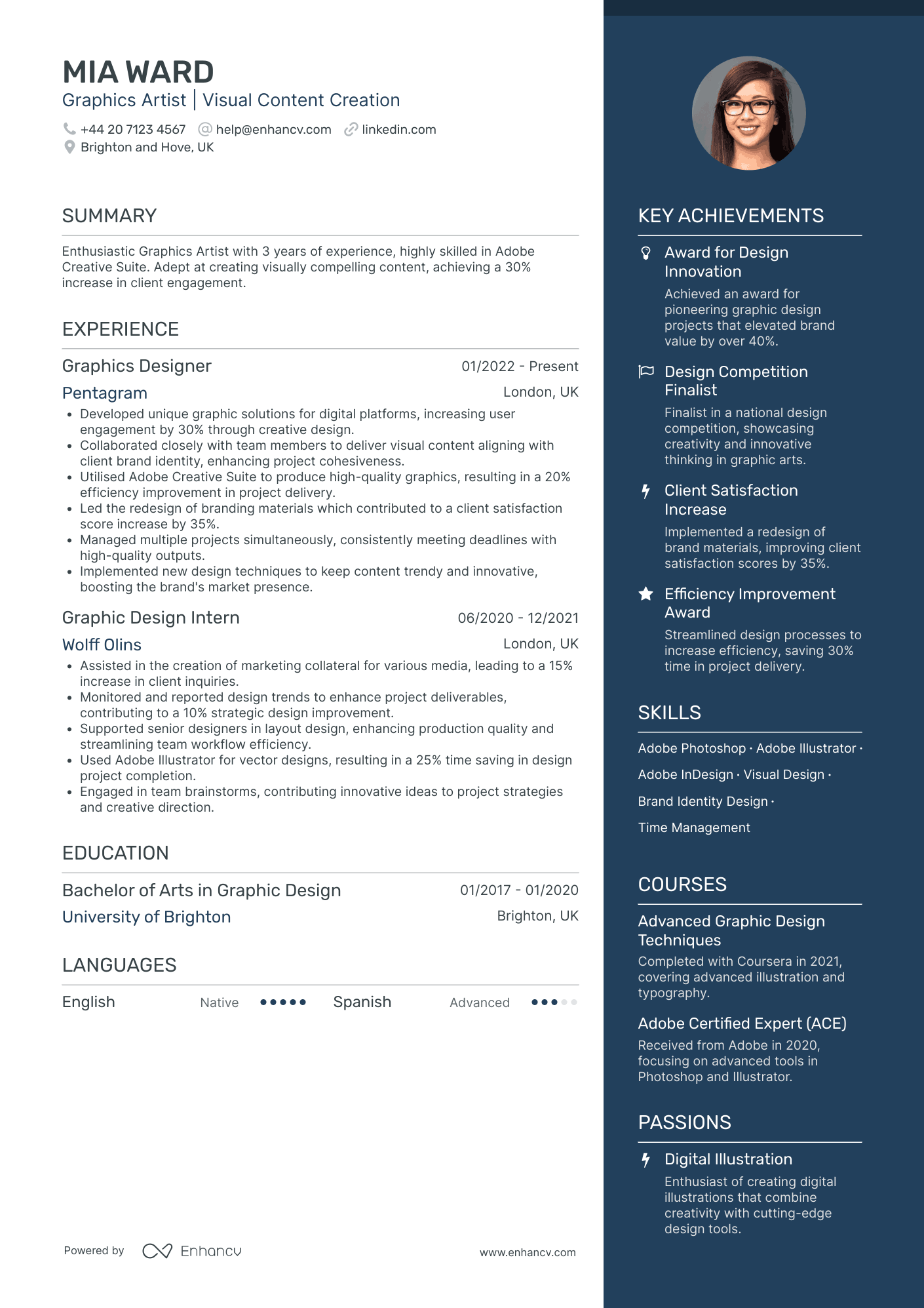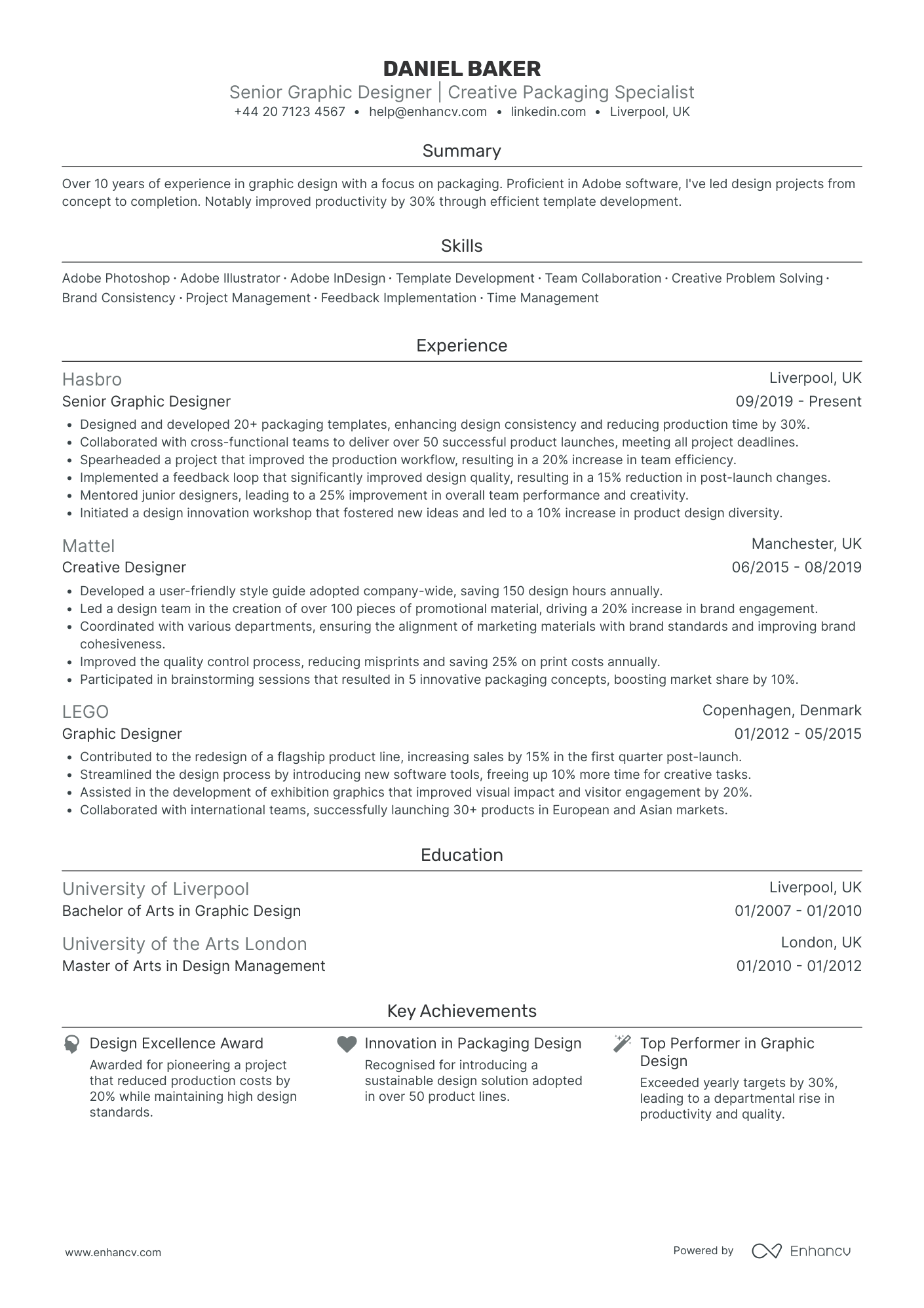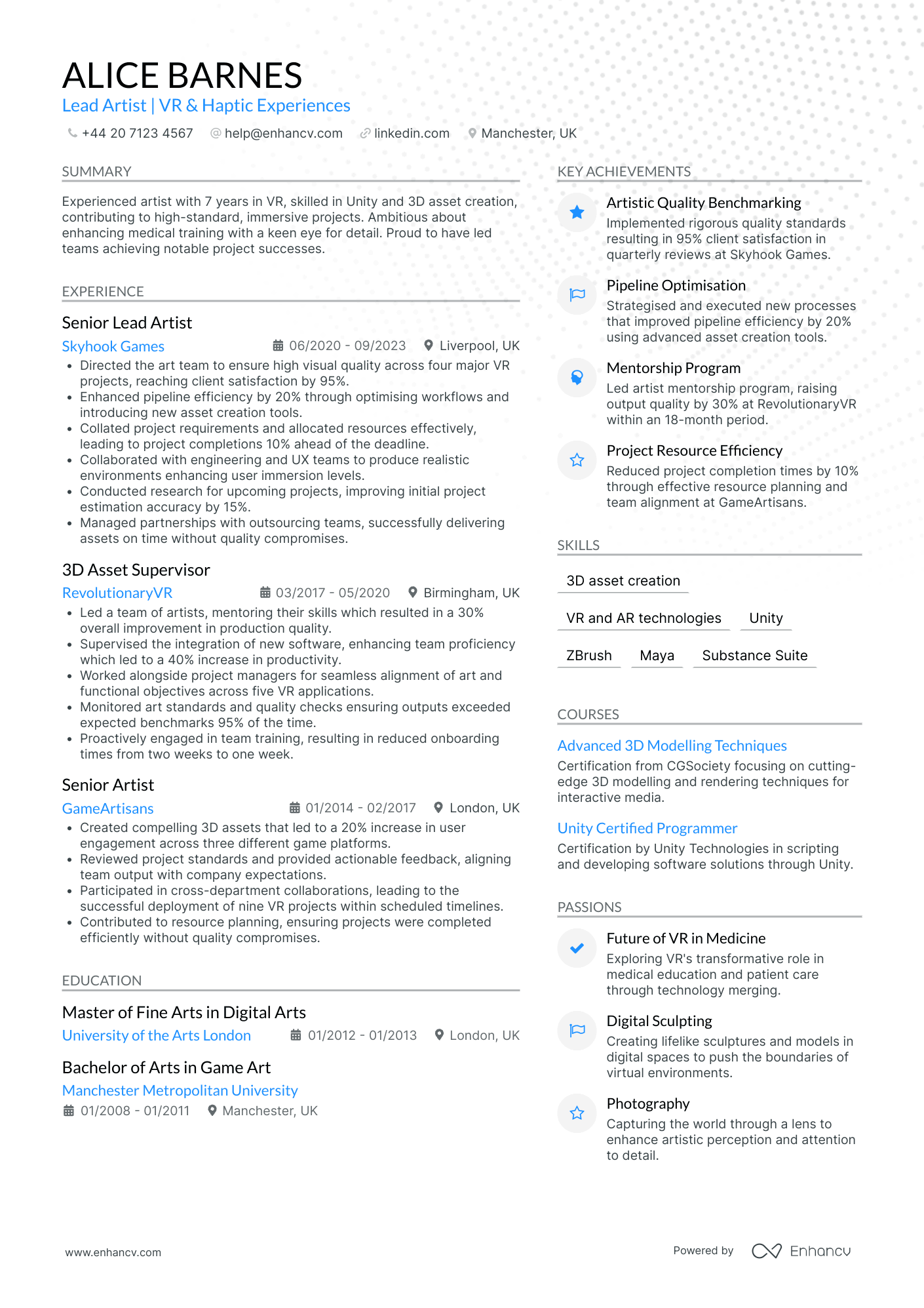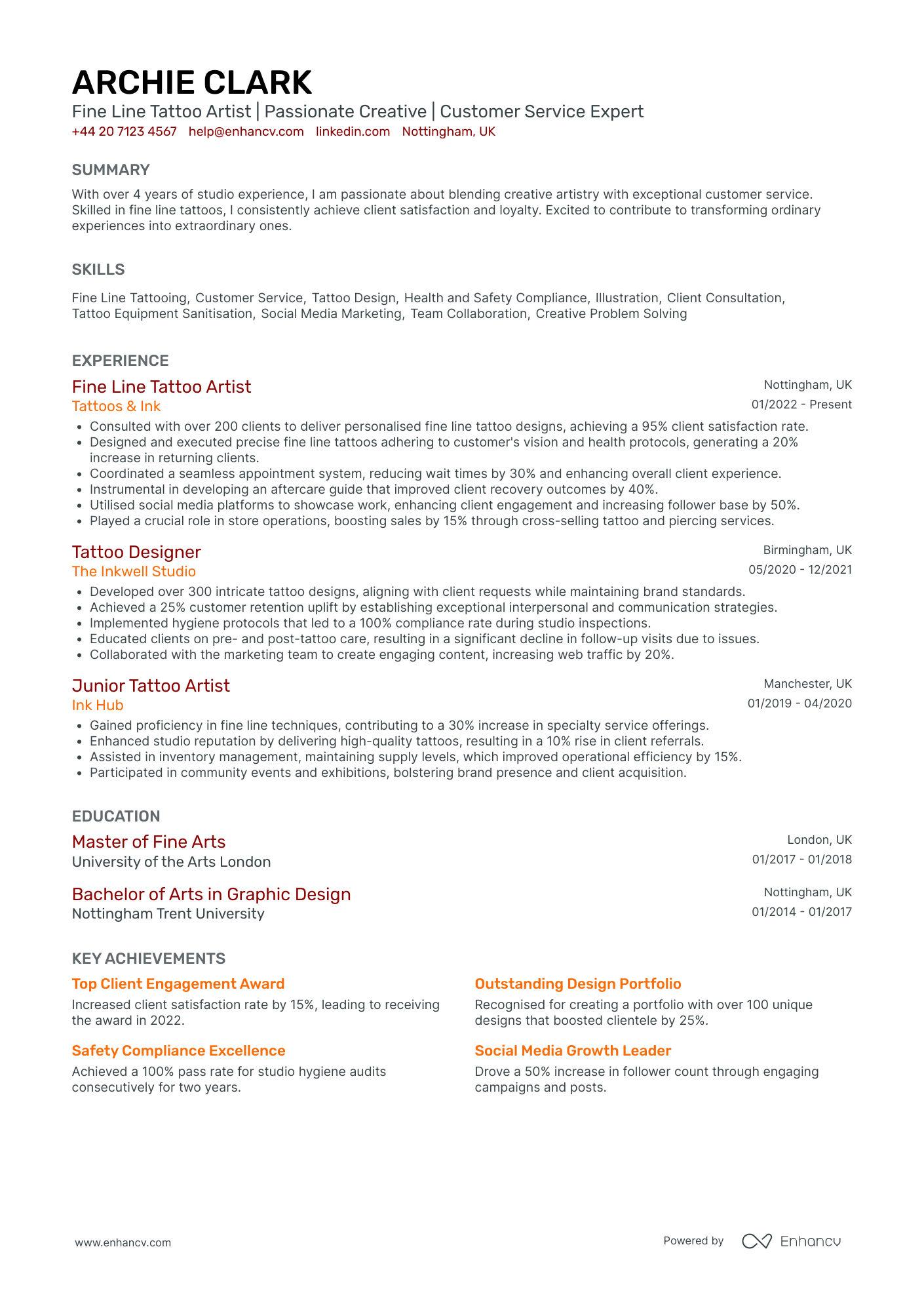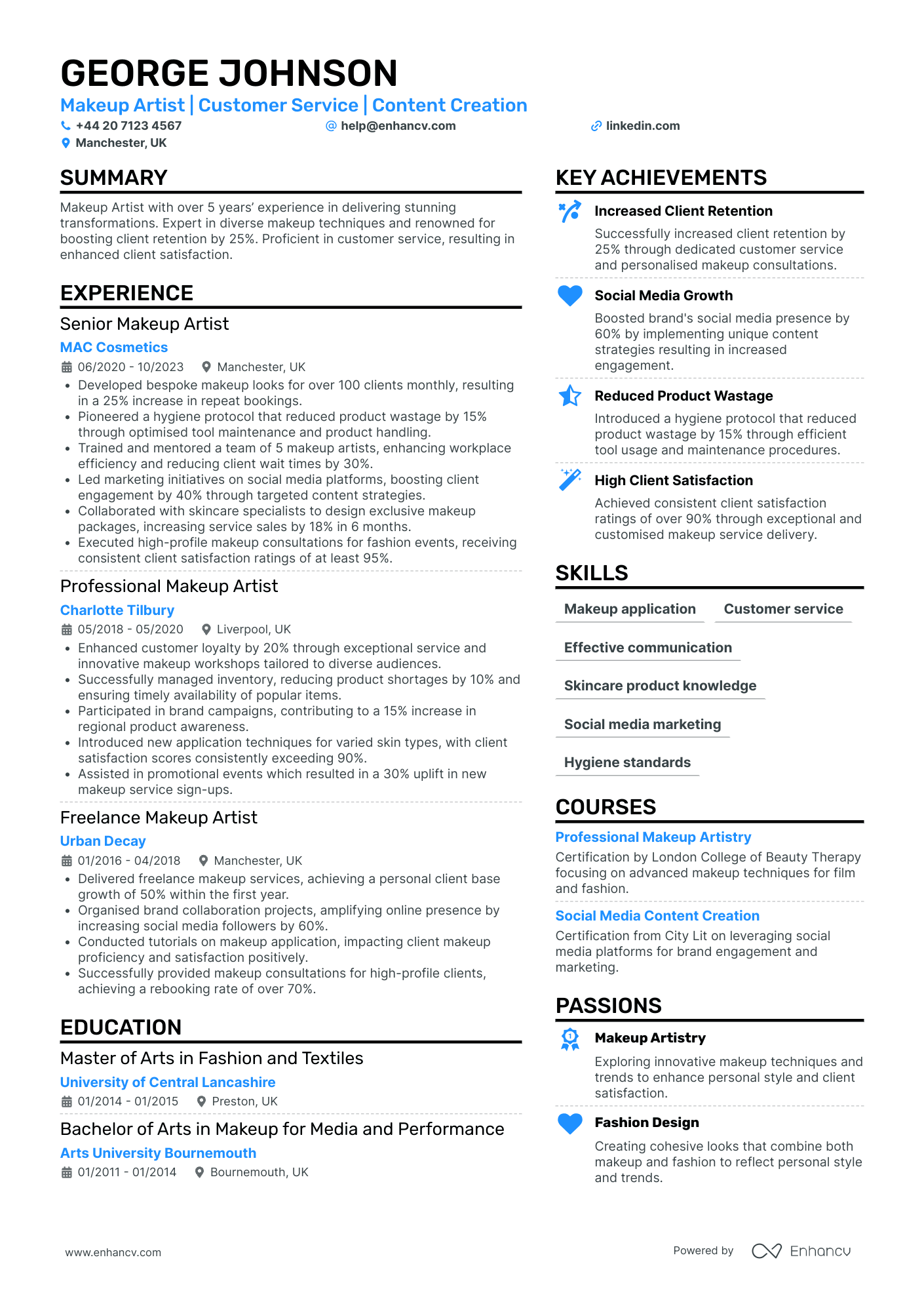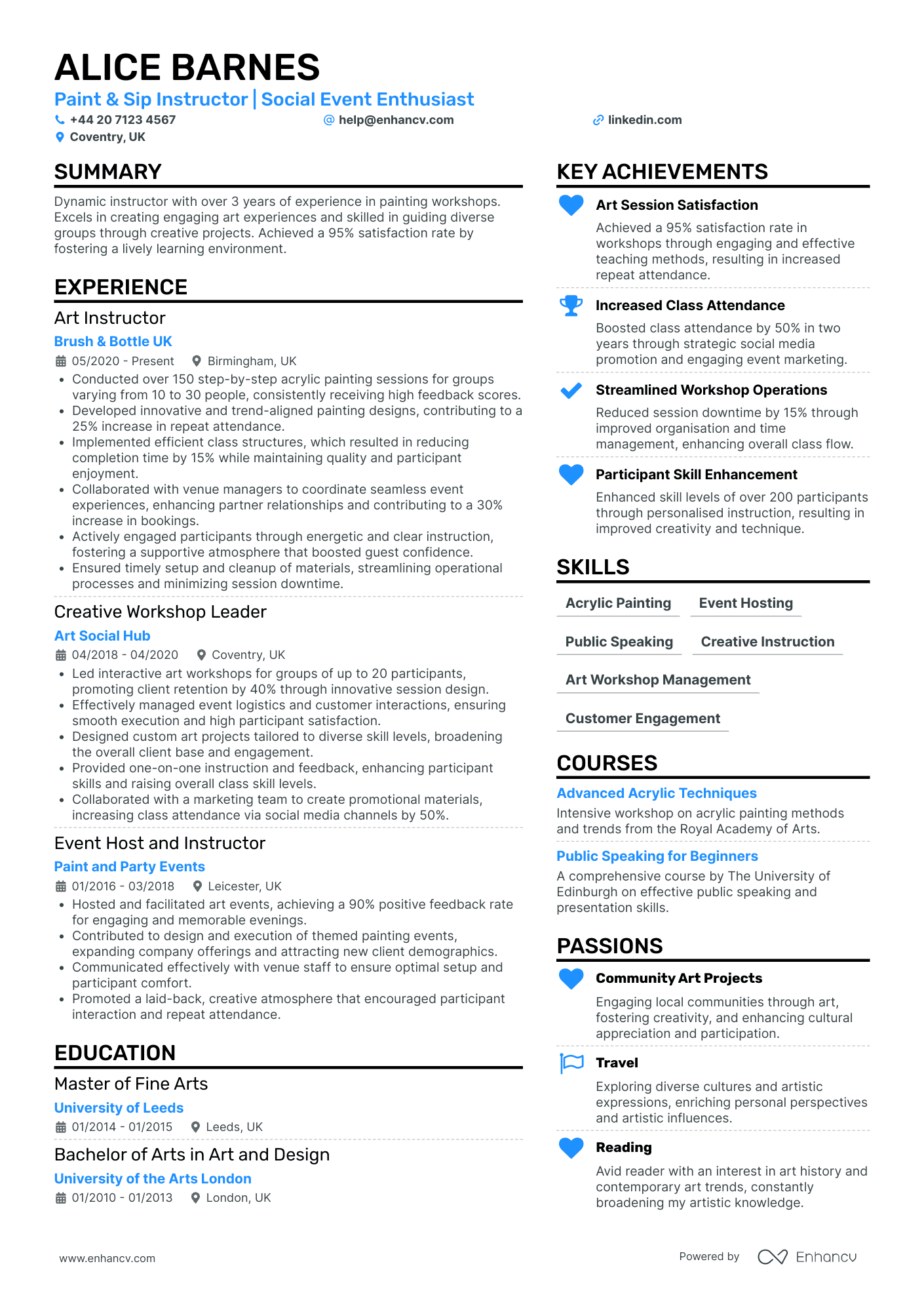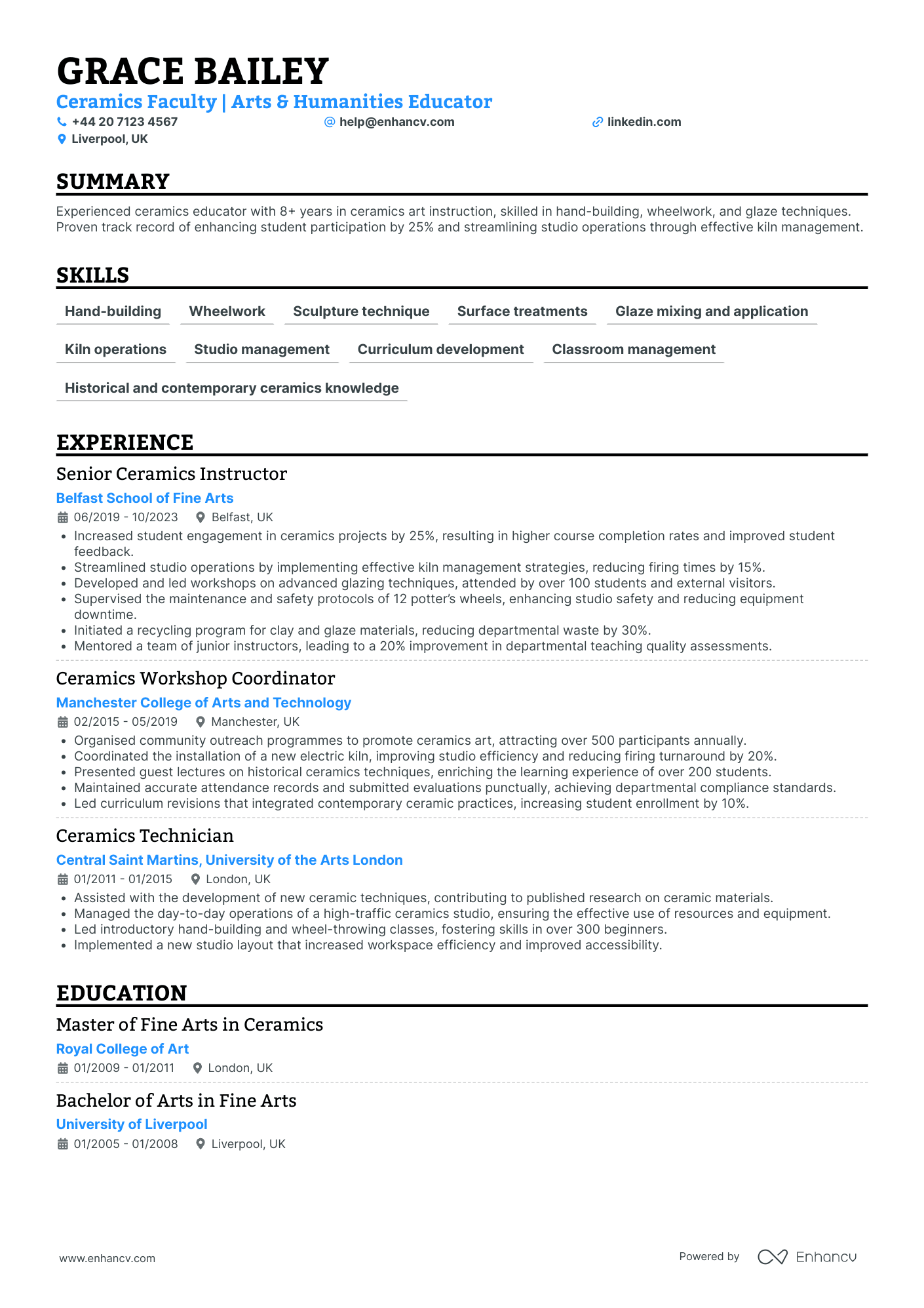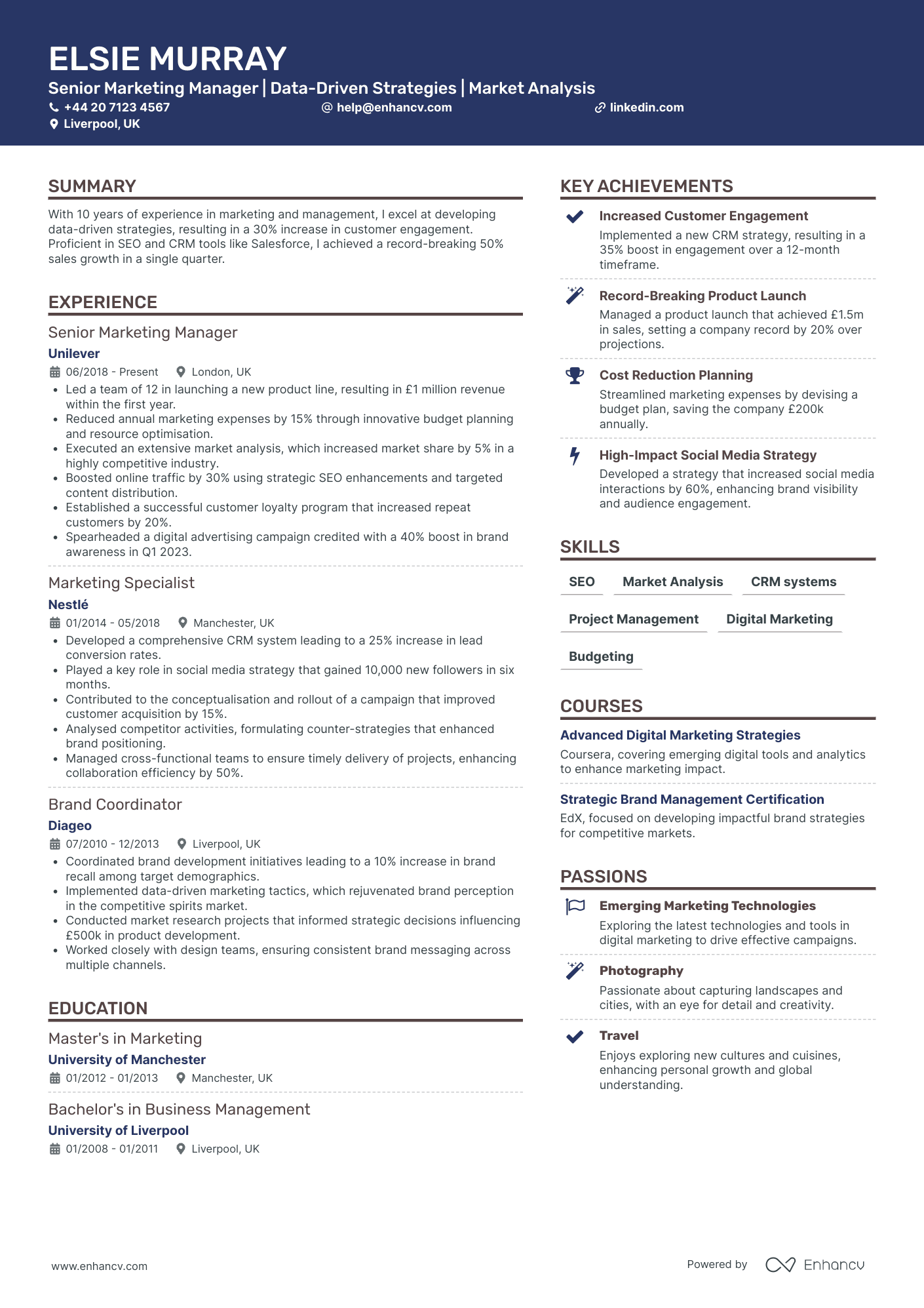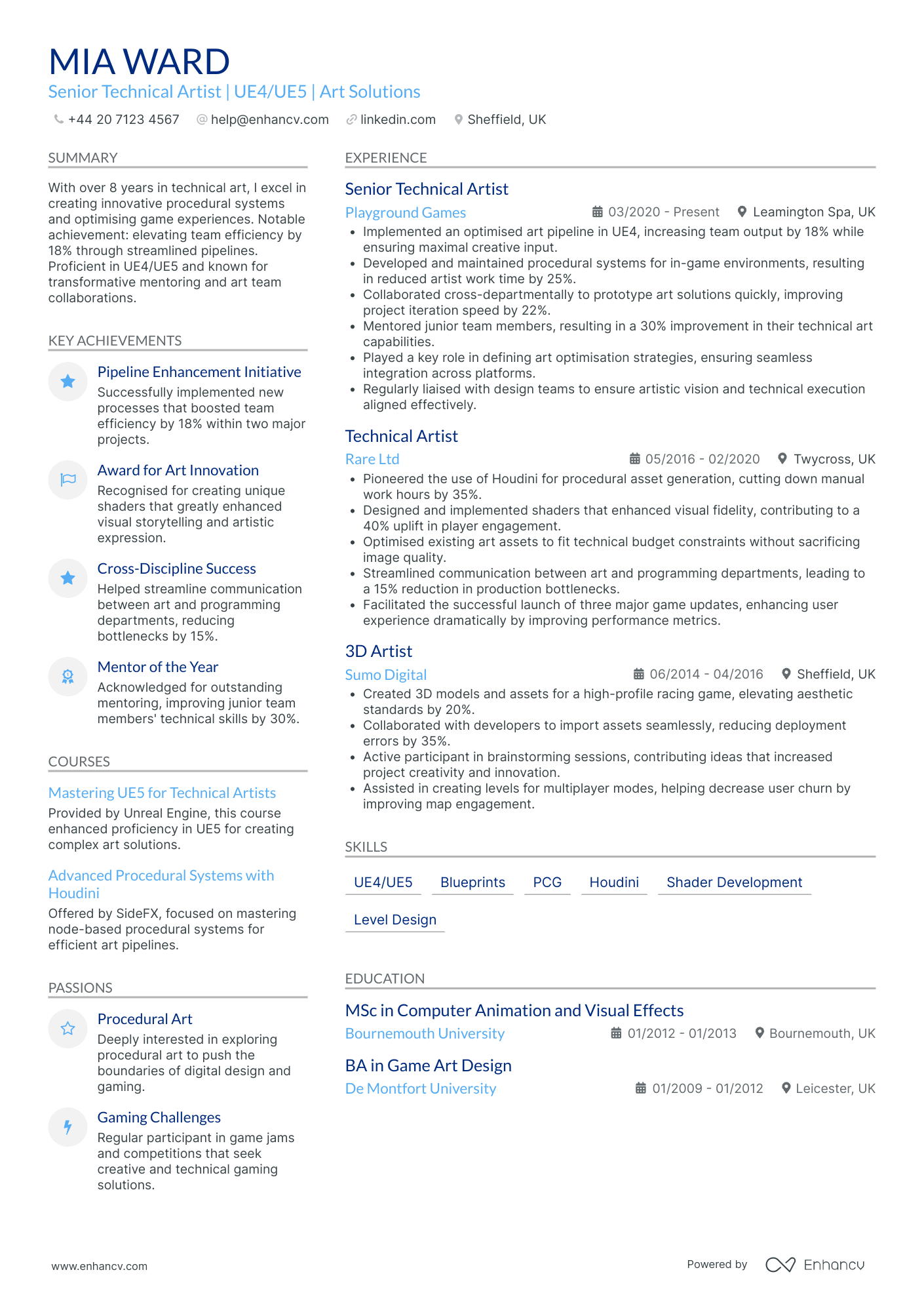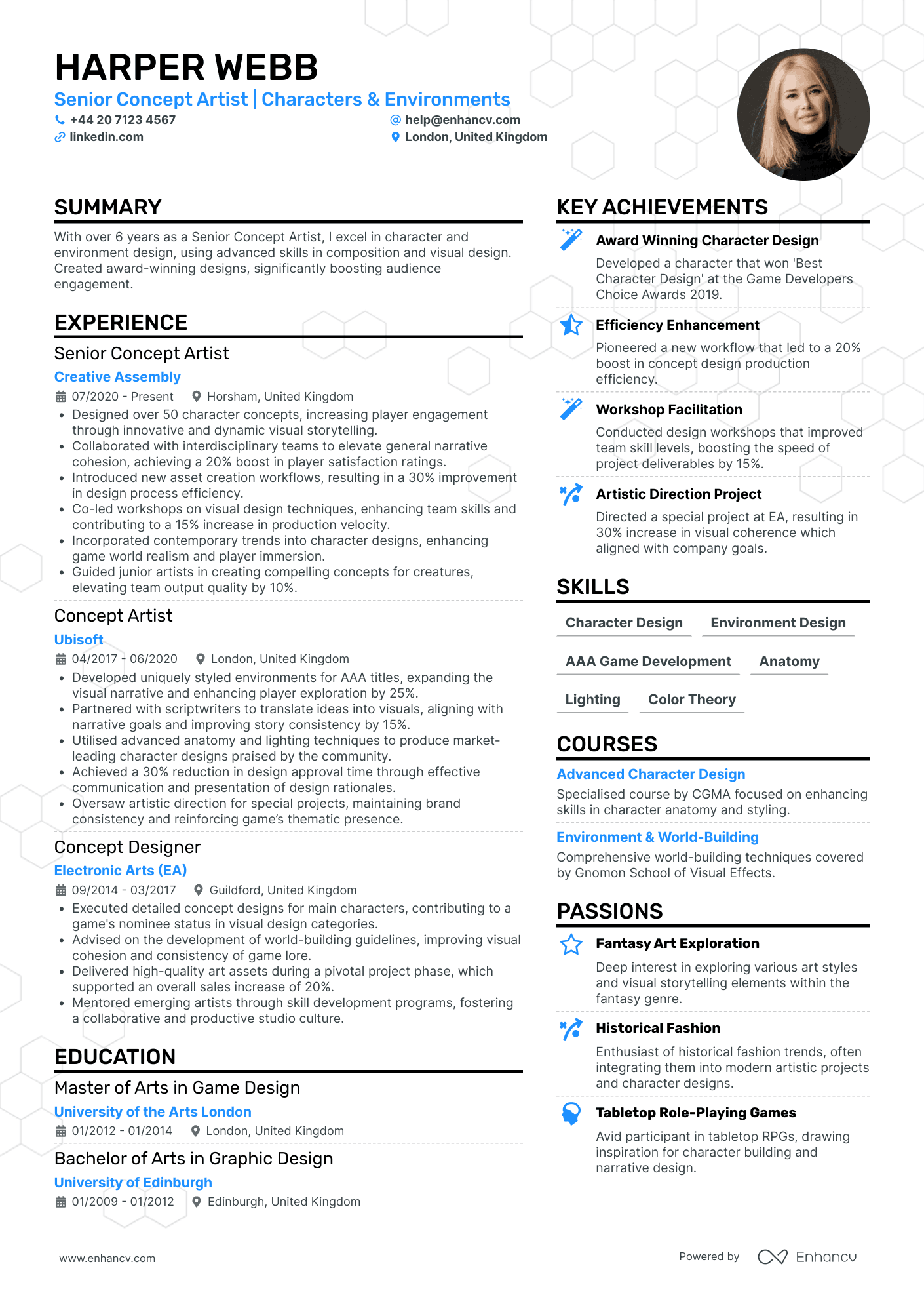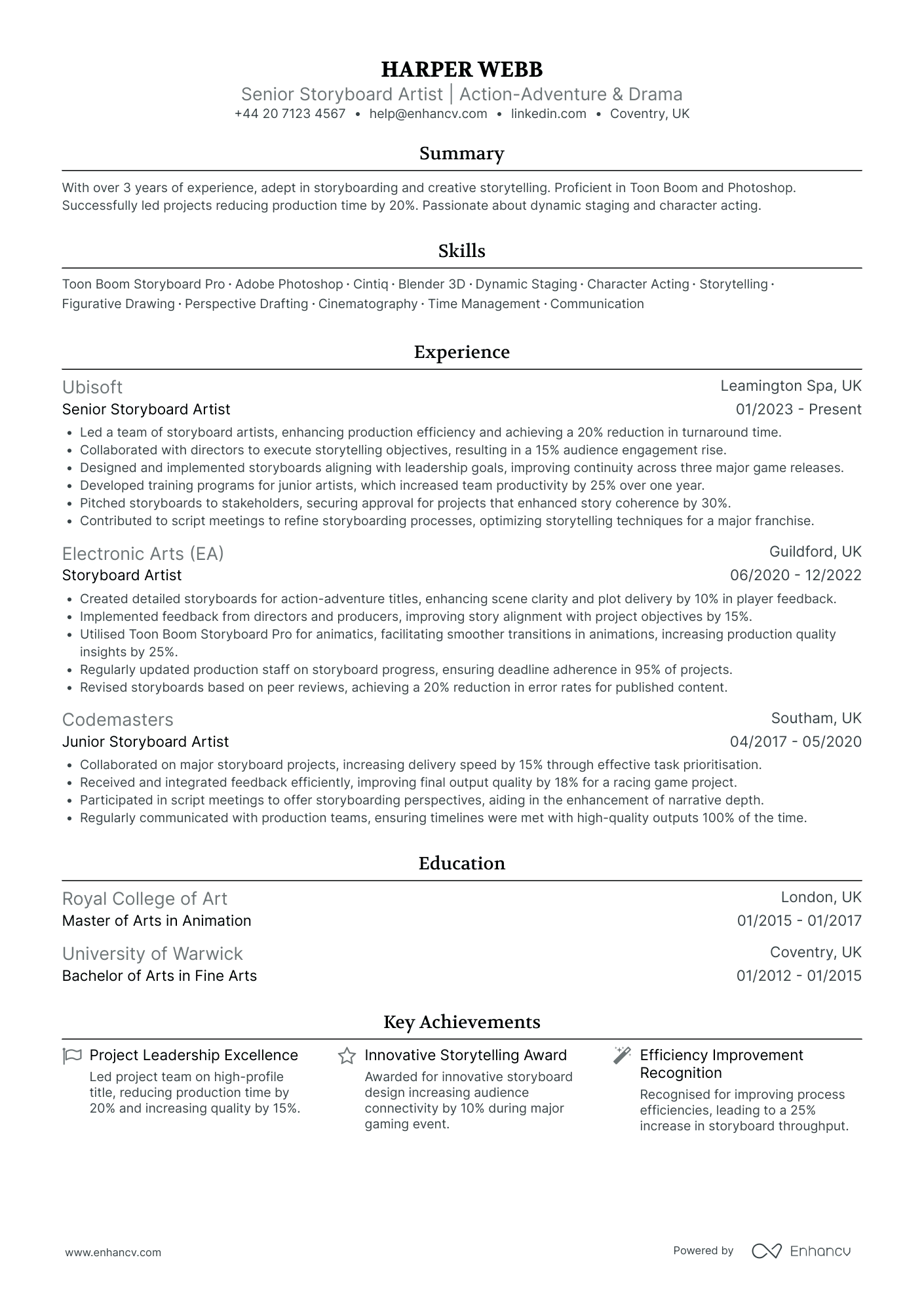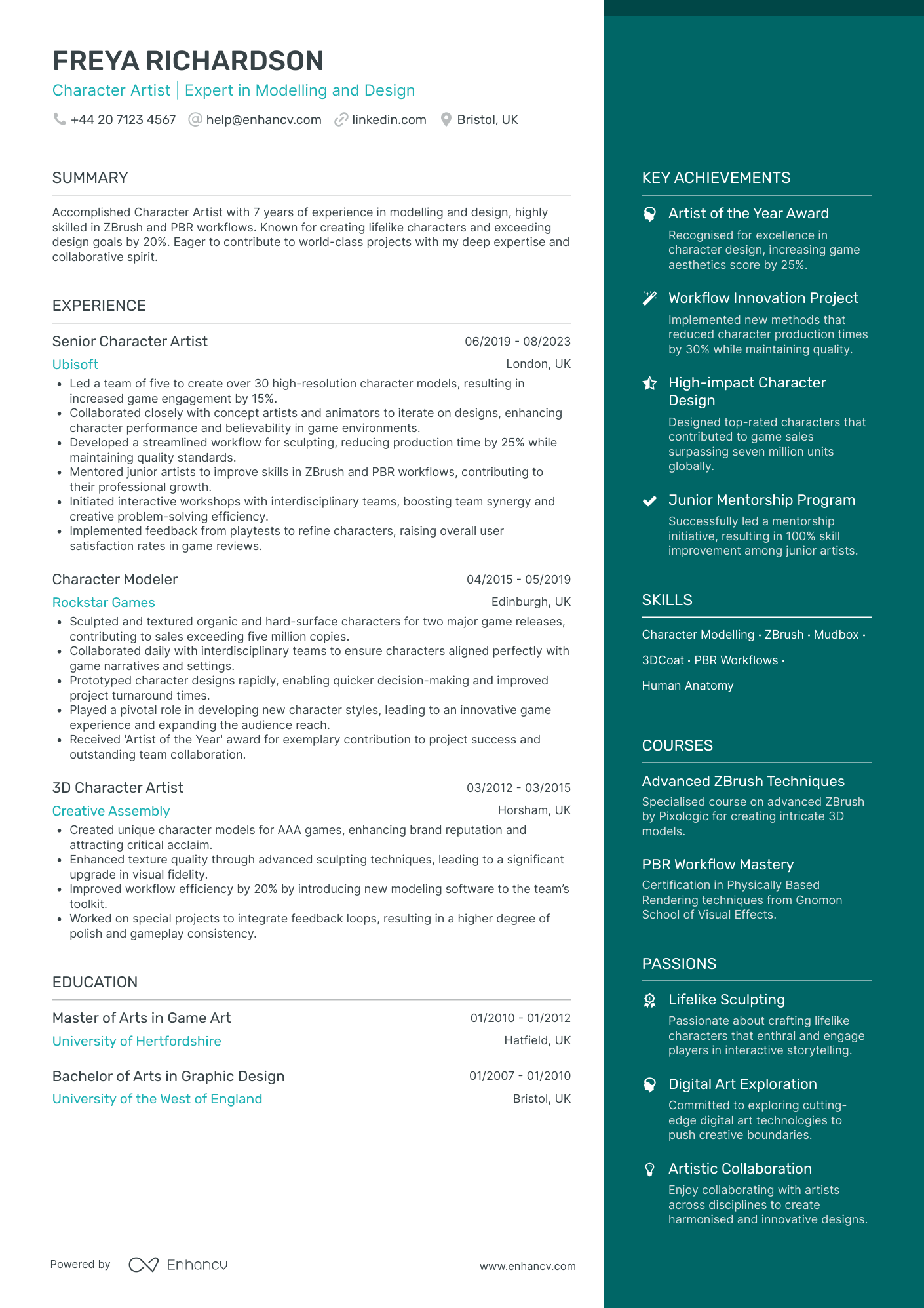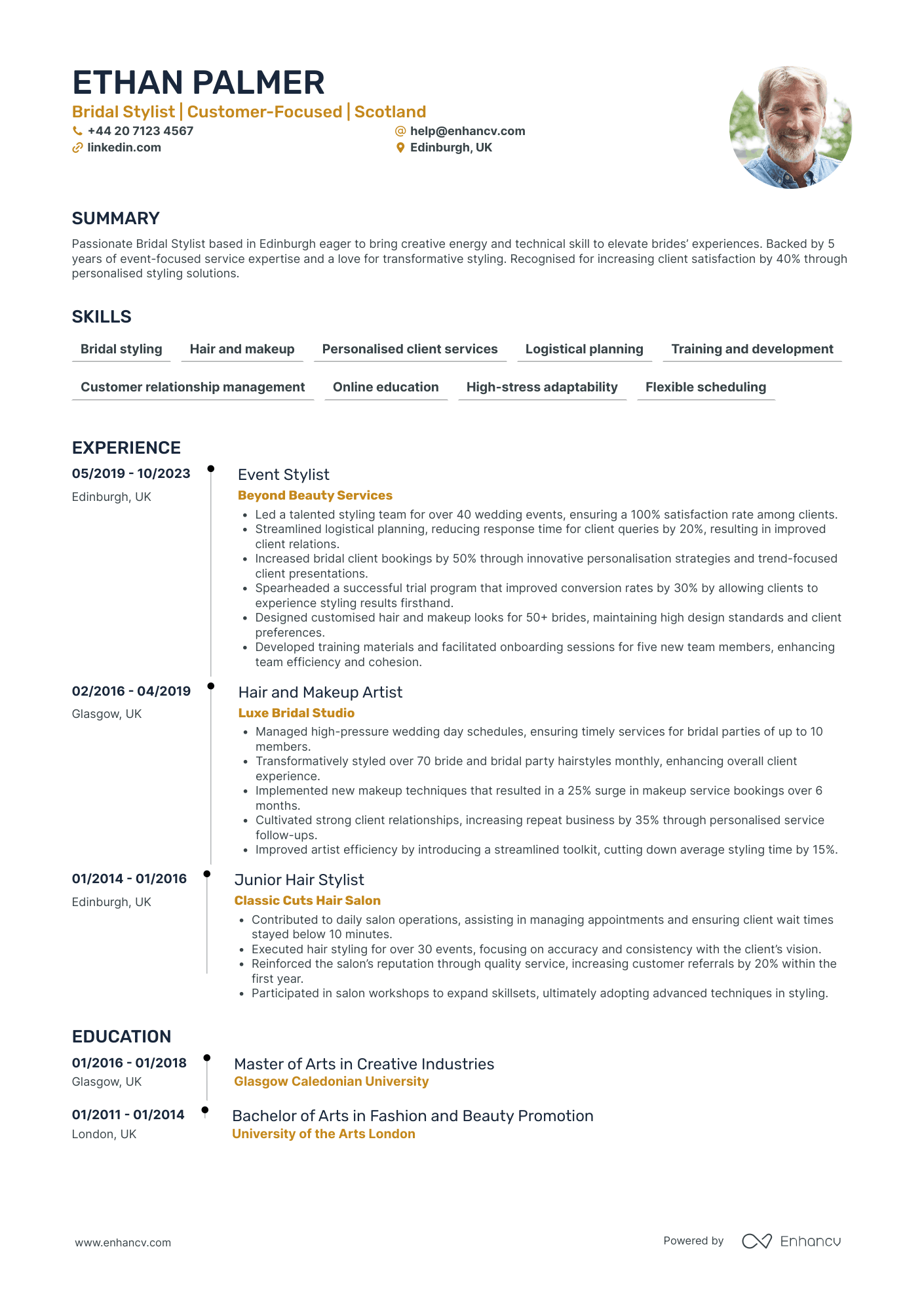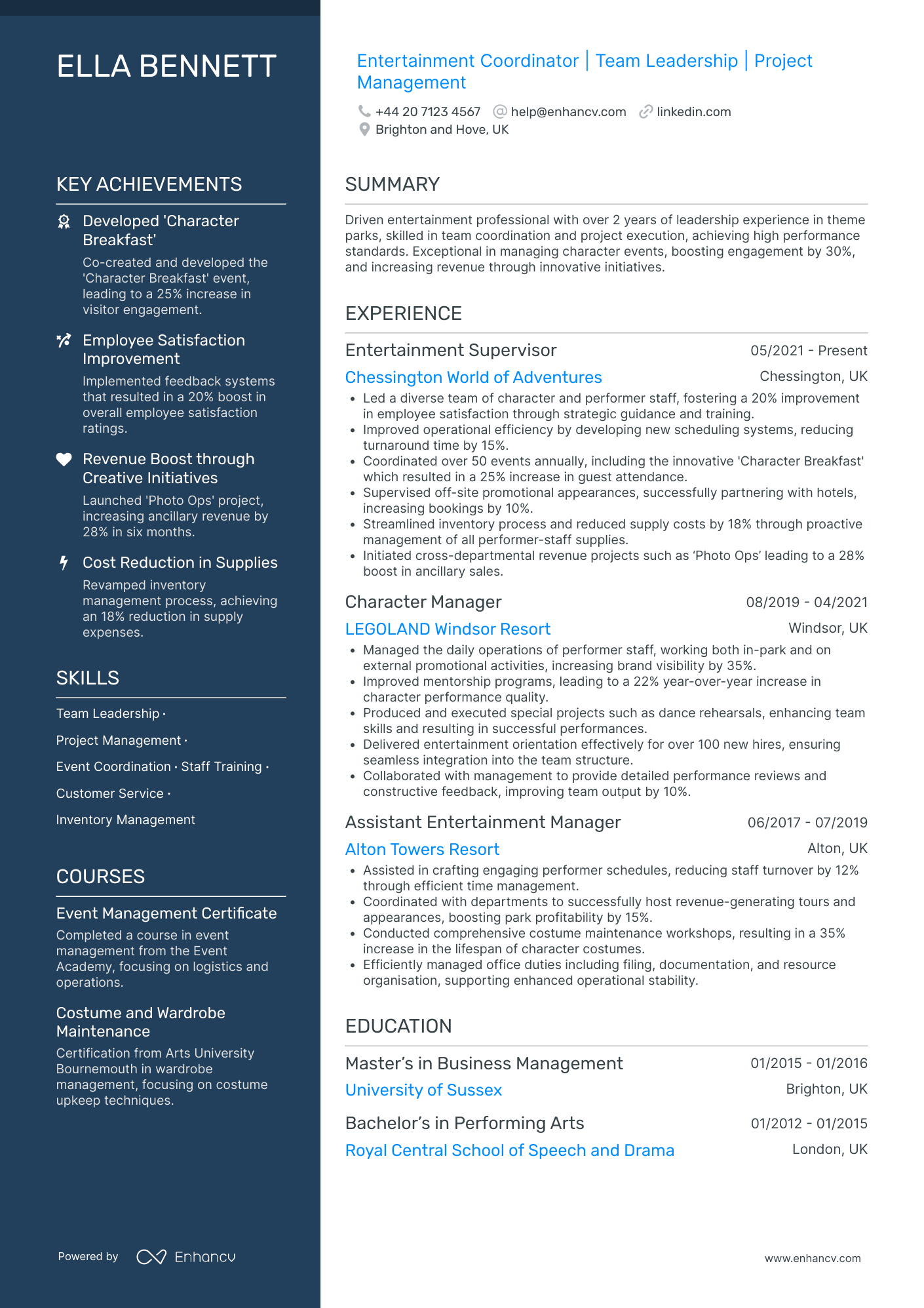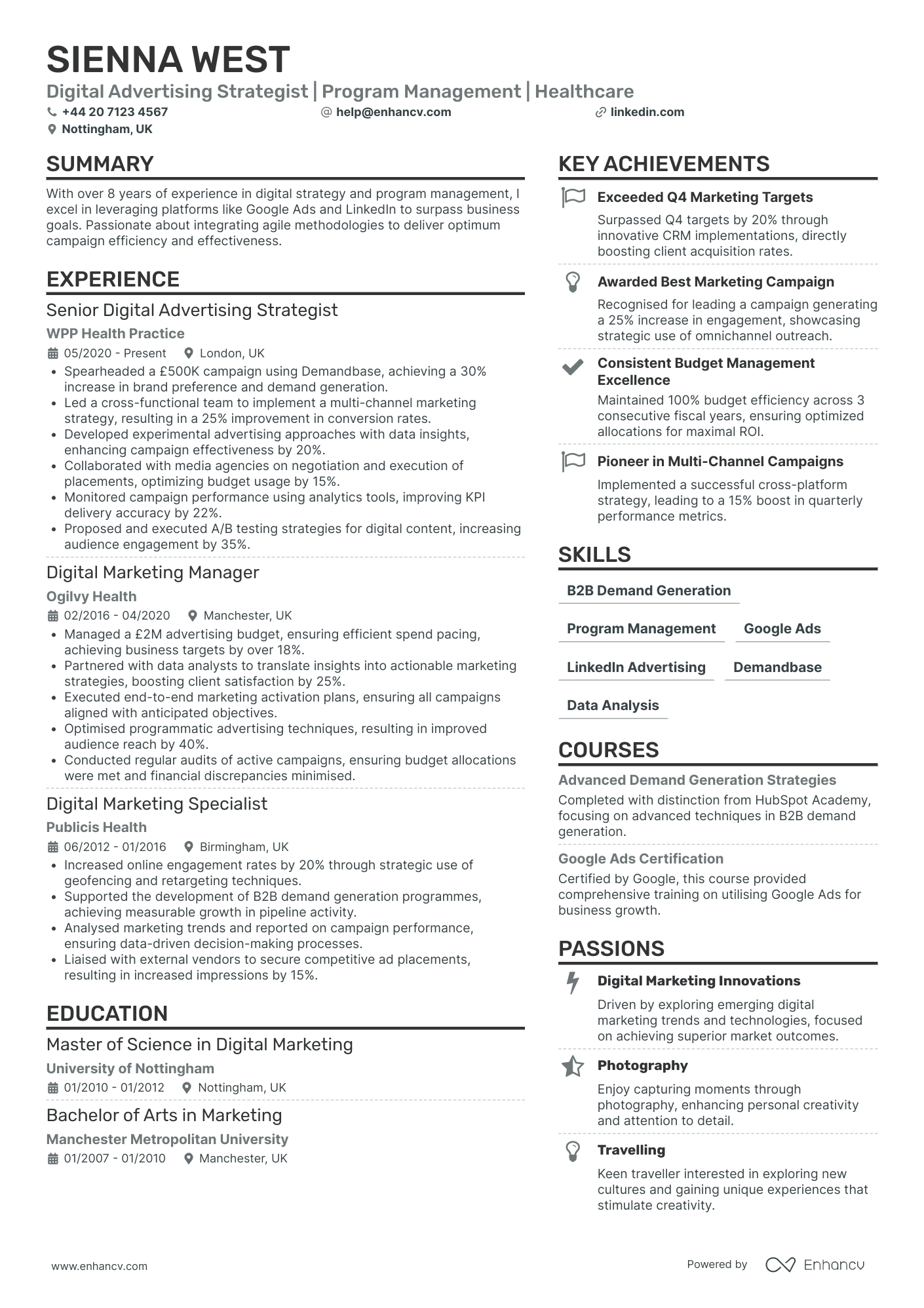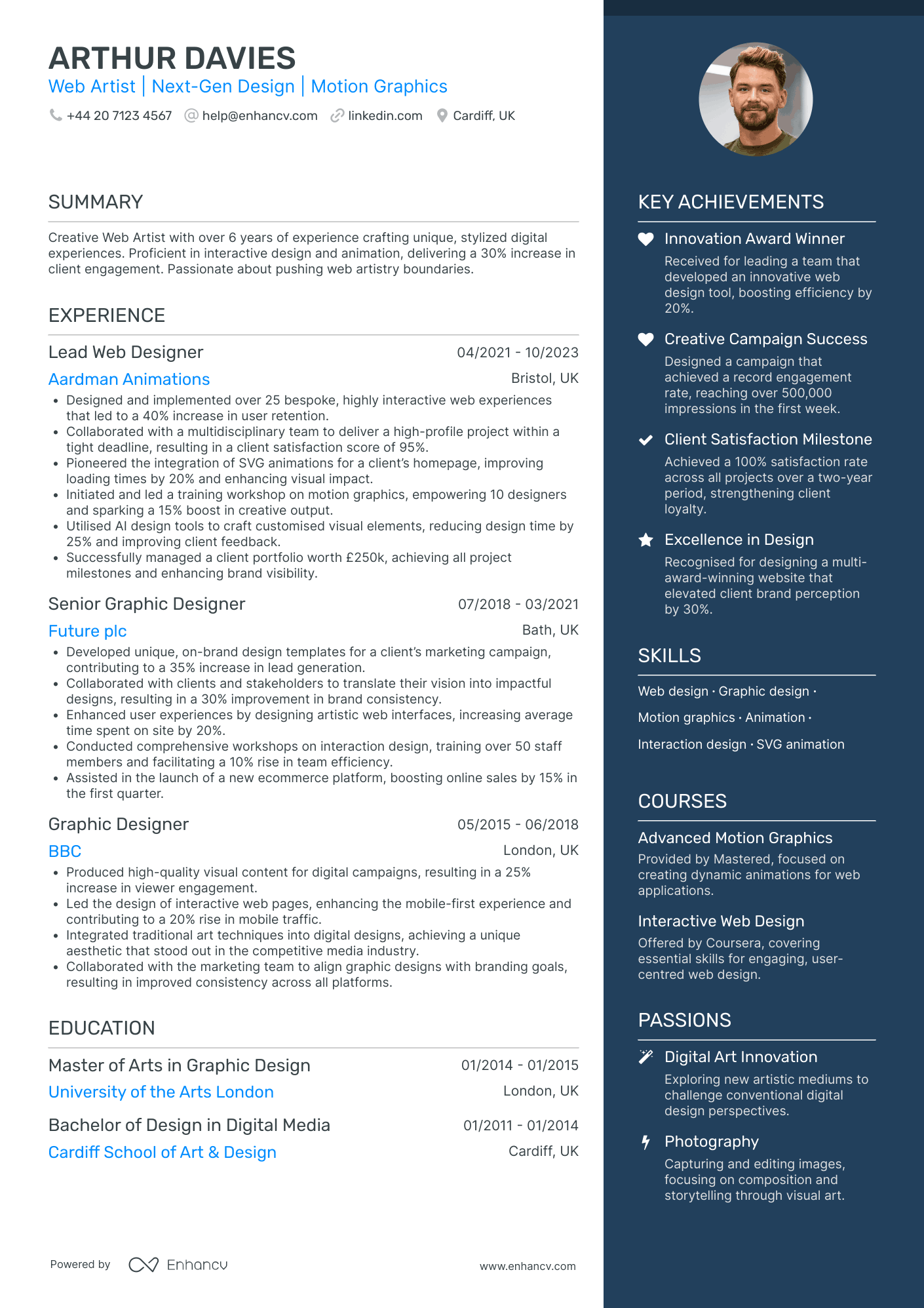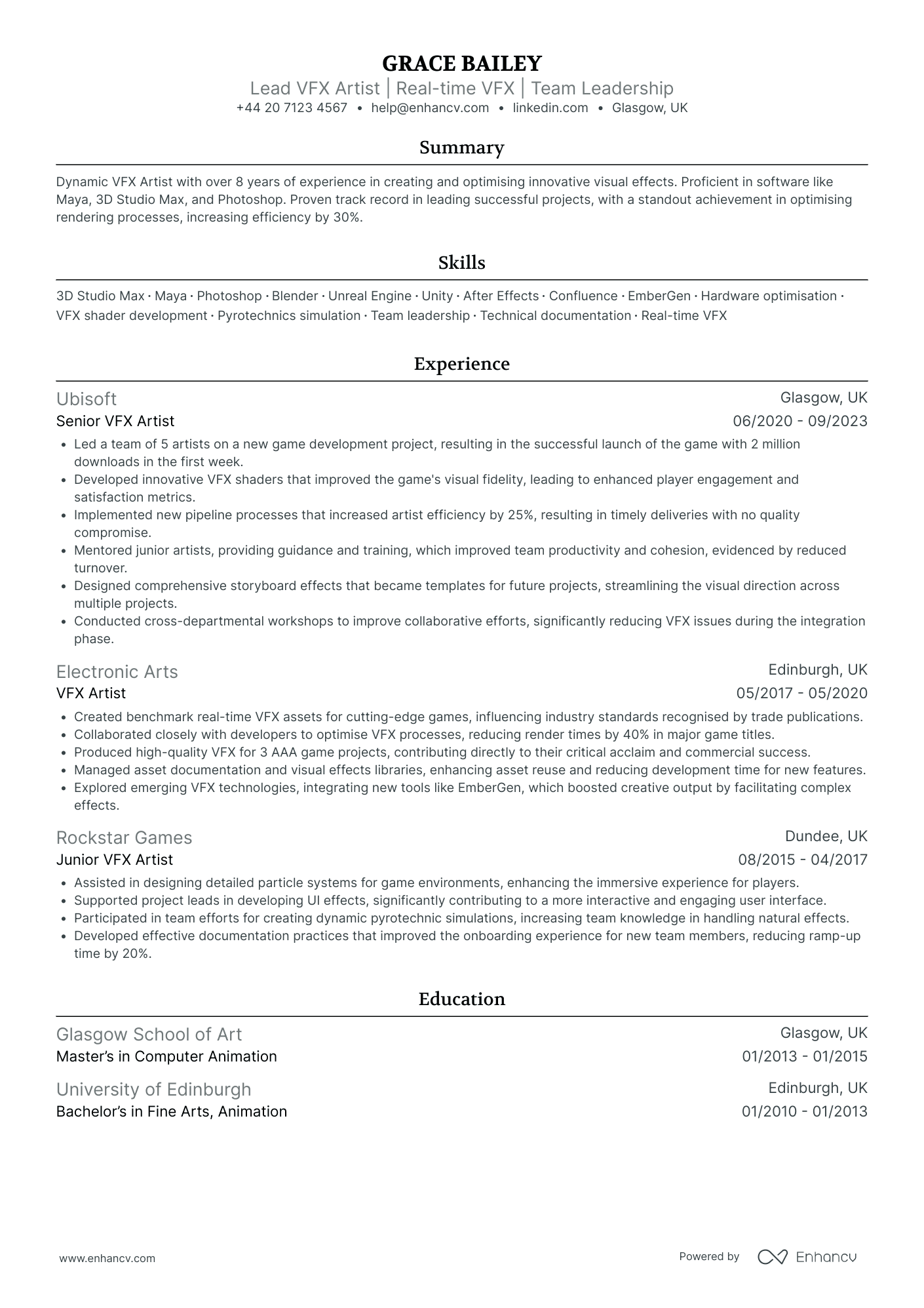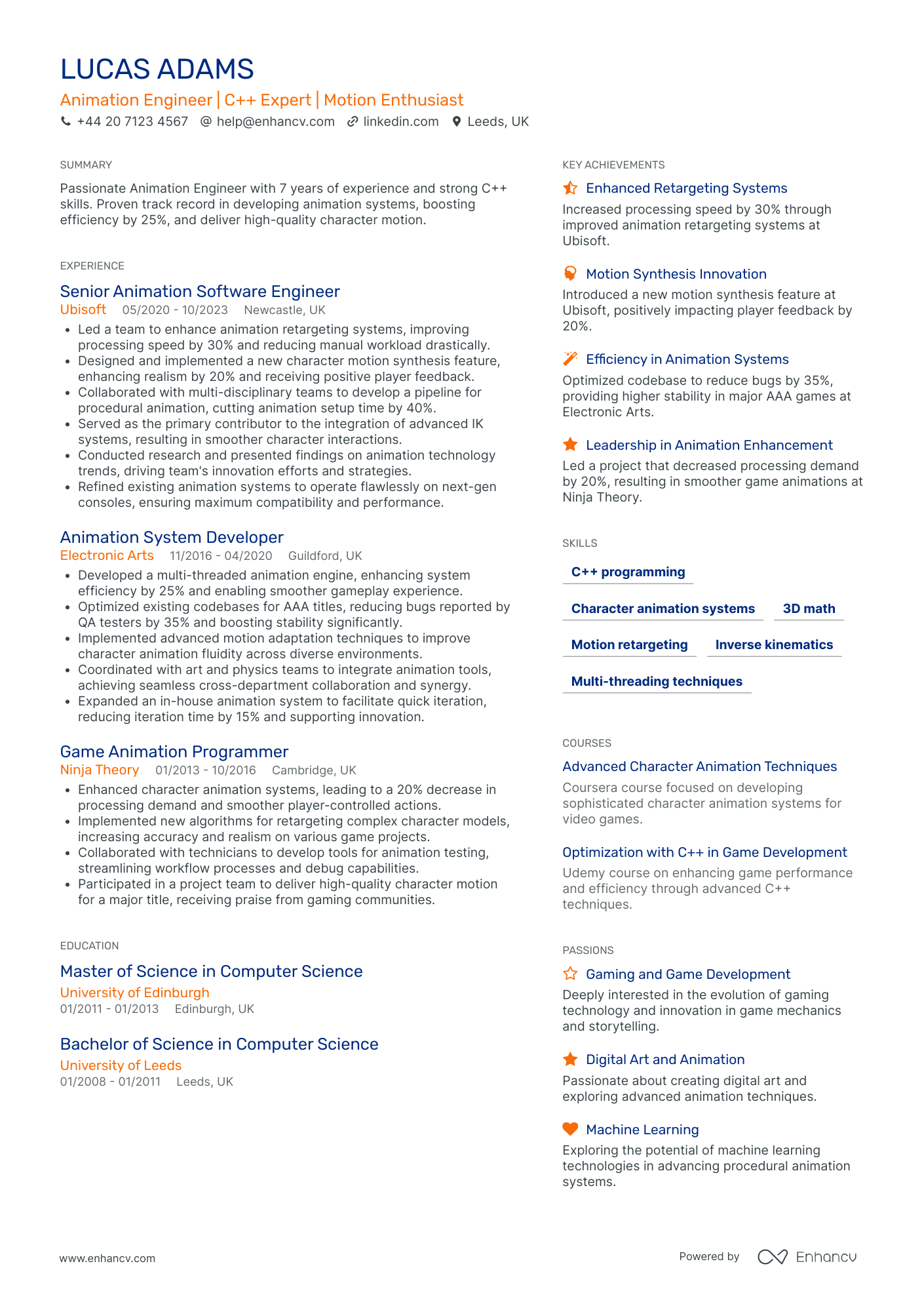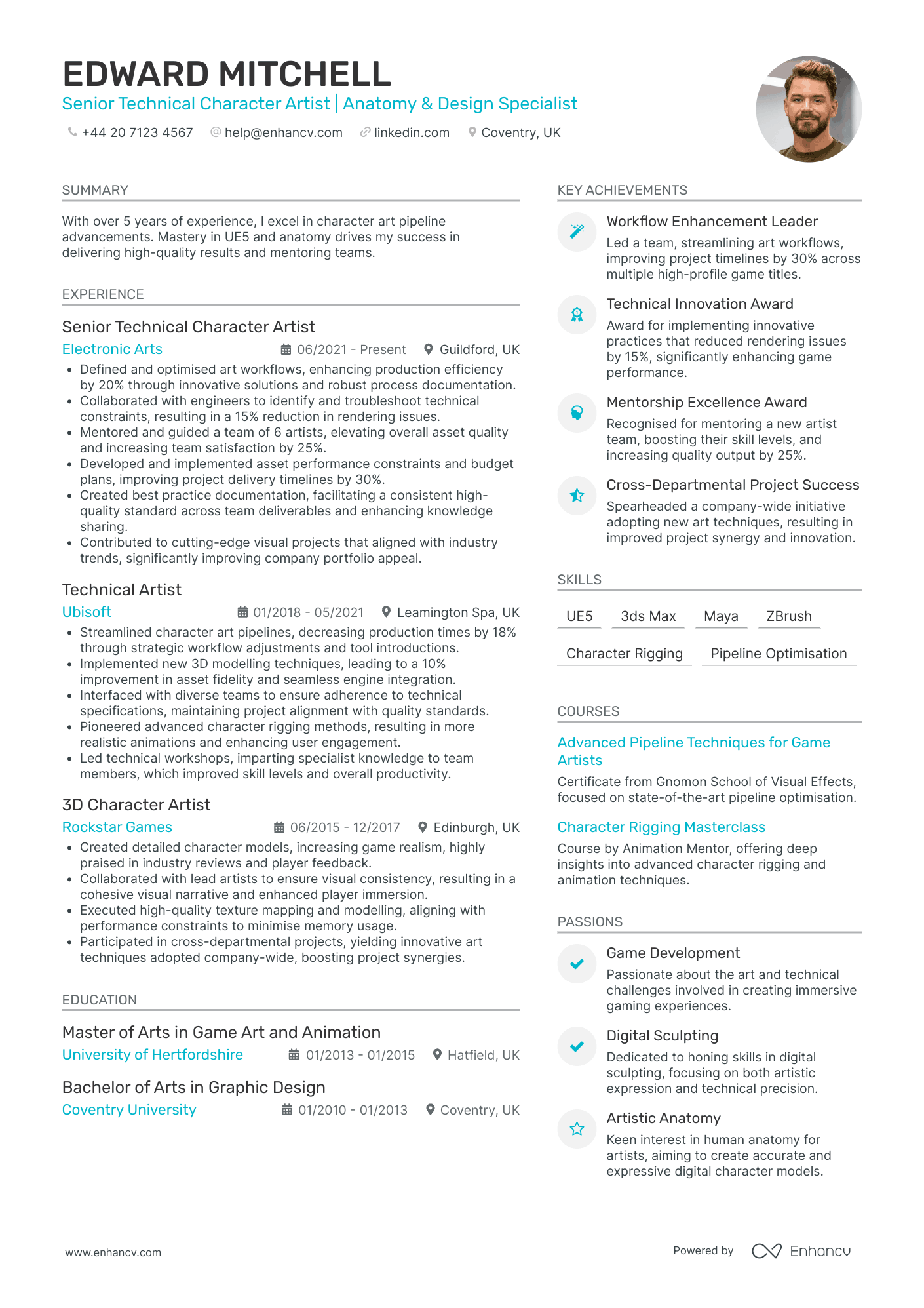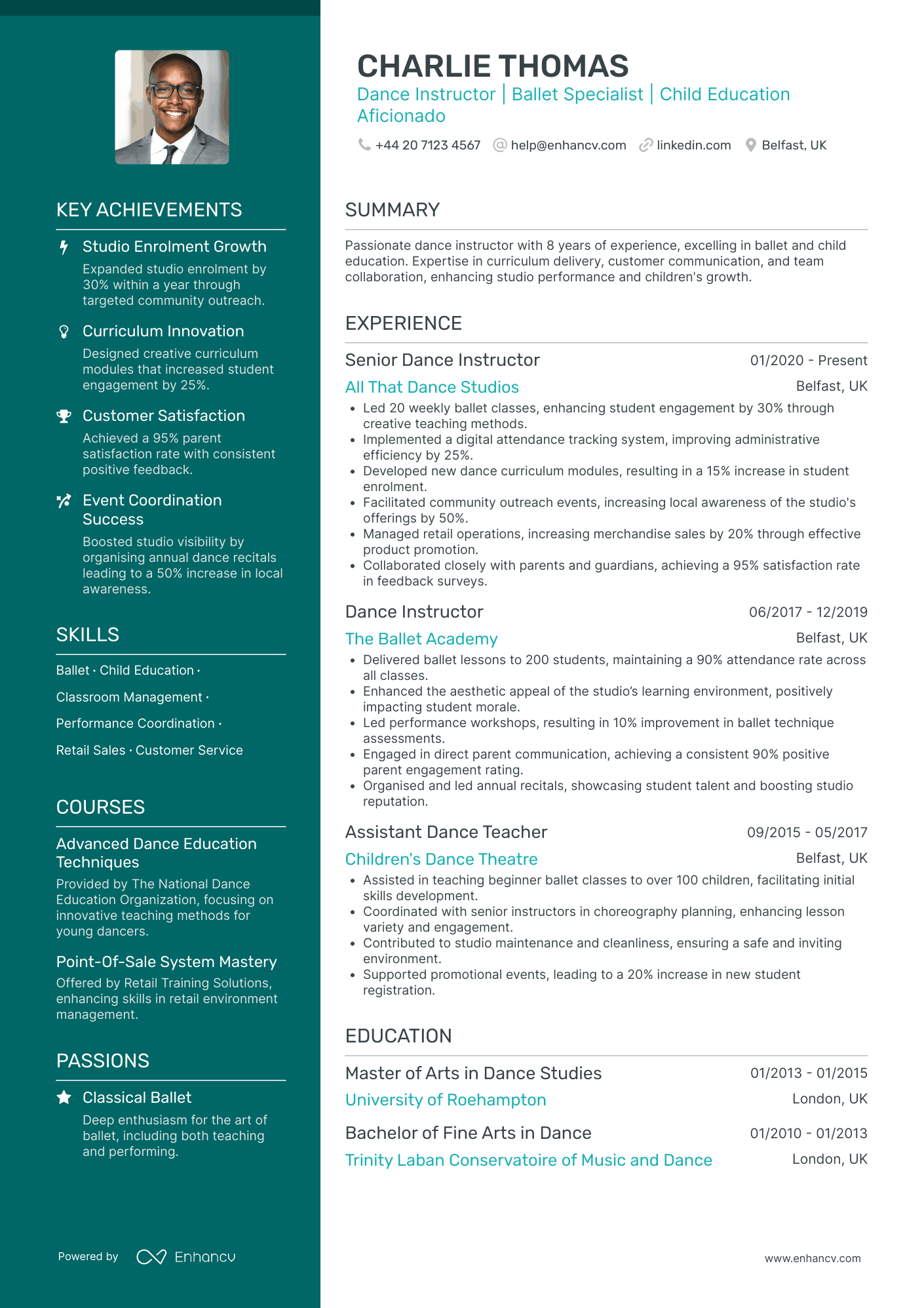One specific CV challenge you might encounter as an artist is effectively showcasing your diverse portfolio and unique style to potential clients or galleries. Our comprehensive guide provides techniques to create a cohesive document that highlights your artistic achievements and individuality, ensuring that your CV stands out in a competitive field.
- Design and format your professional artist CV;
- Curate your key contact information, skills, and achievements throughout your CV sections;
- Ensure your profile stays competitive by studying other industry-leading artist CVs;
- Create a great CV even if you happen to have less professional experience, or switching fields.
When writing your artist CV, you may need plenty of insights from hiring managers. We have prepared industry-leading advice in the form of our relevant CV guides.
Resume examples for artist
By Experience
Junior Graphic Artist in Design
- Effective Structural Layout and Conciseness - The CV's clarity and structure allow for seamless reading, with each section distinctively outlined. This presentation makes it easy to quickly identify Mia Ward's qualifications and track her career progress without overwhelming the reader with unnecessary information.
- Dynamic Career Growth and Consistency in Graphic Arts - Mia's career trajectory reflects steady growth within the graphic arts industry. Her transitions from an intern at Wolff Olins to a full-fledged Graphics Designer at Pentagram signify her upward mobility and consistent dedication to her field.
- Advanced Technical Proficiency and Creative Skill Set - The emphasis on Mia's adept usage of Adobe Creative Suite, enriched by her additional certifications like Adobe Certified Expert, establishes her technical depth in graphic design. Her ability to leverage these tools to drive client engagement underlines her technical prowess and creative acumen.
Senior Concept Artist in Video Games
- Structured Career Growth - Daniel Baker’s CV clearly illustrates a progressive career path from a Graphic Designer at LEGO, through a Creative Designer at Mattel, to his current role as Senior Graphic Designer at Hasbro. This trajectory underscores a consistent upward movement in his career, highlighted by his roles at internationally recognized companies, reflecting his ambition and capability to take on increasing levels of responsibility and challenges.
- Leadership and Mentorship - Beyond his technical skills, Daniel's CV highlights his leadership qualities, particularly his role in mentoring junior designers at Hasbro. The impact of his mentorship is evident in the reported 25% improvement in team performance and creativity, signaling his ability to guide and inspire teams to achieve higher levels of productivity and innovation.
- Innovative Technical Proficiency - Daniel showcases expert-level proficiency in Adobe software, crucial tools in the graphic design industry. His initiative to develop 20+ packaging templates at Hasbro, which improved design efficiency by 30%, emphasizes his deep technical knowledge and ability to deliver impactful tech-driven solutions that enhance overall business operations.
Lead 3D Artist in Virtual Reality
- Impressive career trajectory across notable companies - Alice Barnes' CV reflects a robust career growth path, advancing from a Senior Artist to a Senior Lead Artist over the span of a decade. The progression highlights her increasing responsibilities and expertise, particularly within the VR and Haptic Experiences domain, showcasing a dedicated career in progressively challenging roles.
- Integration of industry-specific tools and methodologies - The CV specifies Alice's proficiency with advanced 3D asset creation tools such as Unity, ZBrush, and Maya. Her experience with the Substance Suite and her role in pipeline optimization demonstrate her solid technical foundation, setting her apart in the competitive VR industry by emphasizing her advanced skills and technical contributions to project efficiency and quality.
- Effective leadership and mentorship abilities - Throughout her roles, Alice has demonstrated strong leadership qualities. She has led and mentored art teams, resulting in significant improvements in production quality and efficiency. Her ability to manage teams effectively, coupled with her success in implementing a mentorship program, underscores her capability to inspire and elevate team performance, aligning with her role as a Lead Artist.
Entry-Level Tattoo Artist
- Comprehensive Career Progression - Archie Clark’s CV illustrates a well-defined career trajectory, displaying a progression from a Junior Tattoo Artist to a Fine Line Tattoo Artist. This growth highlights their capability to advance and adapt within the tattoo industry while gaining expertise in more specialized techniques over time.
- Focus on Client Satisfaction and Retention - Clark demonstrates a strong commitment to client satisfaction, as evidenced by a 95% client satisfaction rate and a 25% customer retention uplift at previous positions. Achievements like these underline their customer service acumen and ability to cultivate long-term client relationships, which are critical in the service industry.
- Industry-Specific Expertise in Fine Line Artistry - The CV highlights a specialization in fine line tattooing, underscoring Clark’s technical proficiency in this niche area. This is further supported by their coursework in advanced fine line tattoo techniques and consistent focus on enhancing detailed and intricate designs.
Experienced Makeup Artist in Film Industry
- Strategic career progression and role elevation - The CV effectively outlines George Johnson's career growth, demonstrating a trajectory from a Freelance Makeup Artist to a Senior Makeup Artist at MAC Cosmetics. This advancement highlights a history of increasing responsibilities and skill augmentation, highlighting their commitment and upward mobility within the beauty industry.
- Emphasis on impactful achievements and industry-specific metrics - Johnson’s CV is rich with results-oriented achievements, such as increasing client retention by 25% and boosting client engagement by 40%. These metrics not only underscore a strong focus on customer satisfaction but also illustrate their capacity to drive impactful outcomes in a competitive field.
- Robust foundation in specialized makeup techniques and customer relations - Unique elements of this CV include detailed contributions to product hygiene protocols and innovative application techniques, illustrating Johnson's proficiency in both technical and creative aspects of makeup artistry. Additionally, his experience in customer service and mentorship speaks to a well-rounded and adaptable professional.
Mid-Level Matte Painter Artist in Film
- Content presentation is clean and concise - The CV is structured clearly with sections such as summary, experience, education, skills, and achievements. Each section is meticulously articulated, allowing ease of understanding and providing a comprehensive overview of Alice's professional background.
- Rich career trajectory in art instruction and event hosting - Alice's career shows a consistent growth in the realm of art education and social events, advancing from an Event Host and Instructor to leading roles such as Art Instructor and Creative Workshop Leader, signifying promotion and expanded responsibilities over time.
- Emphasis on leadership and cross-functional collaboration - The CV highlights Alice's strong leadership skills in managing workshops and collaborating with various teams, such as venue managers and marketing teams, to enhance the overall participant experience and promote events effectively.
Experienced Ceramic Artist
- Structured Career Advancement - Grace Bailey's CV outlines a clear progression within the ceramics education field, moving from a technician role to a senior instructor position over a decade. This trajectory demonstrates not only her dedication to the discipline but also her growing leadership responsibilities and influence within the industry.
- Industry-Specific Technique Mastery - The CV highlights Grace’s expertise in specialized techniques like hand-building, wheelwork, and glaze mixing. Such skills underscore her technical proficiency in ceramics, showcasing her as a knowledgeable practitioner who can both educate students and contribute to research within the field.
- Innovative Educational Impact - Grace’s achievements in enhancing student participation and introducing sustainability initiatives reveal her commitment to advancing educational quality and environmental responsibility. Notably, her efforts in increasing engagement rates and waste reduction directly reflect her substantial contributions to institutional goals and community enrichment.
Entry-Level Sand Artist
- Effective career progression and adaptability - Elsie Murray's CV illustrates a clear career trajectory from a Brand Coordinator to a Senior Marketing Manager. This progression reflects their ability to take on increased responsibilities, manage larger teams, and adapt to various marketing environments across different companies such as Unilever, Nestlé, and Diageo.
- Industry-relevant tools and technical proficiency - The CV highlights Elsie's expertise in using advanced tools such as SEO, CRM systems like Salesforce, and data analysis techniques. These technical skills are complemented by hands-on experience in project management and budgeting, which are essential for driving successful marketing strategies.
- Impactful achievements with business relevance - Elsie demonstrates a strong focus on results, evidenced by achievements like leading a product launch that generated £1 million in revenue, and reducing marketing expenses by 15%. These accomplishments are not just numbers but reflect meaningful business impact, like increasing customer engagement and boosting brand awareness.
Senior Artist in Game Design
- Detailed Career Progression - Mia Ward's CV demonstrates logical career growth from a 3D Artist to a Senior Technical Artist. This trajectory shows clear development in technical expertise and leadership capabilities, which is vital for any employer looking for experienced hires who understand the dynamics of creative and technical roles within the gaming industry.
- Innovative Use of Technology - The CV emphasizes Mia's proficiency with industry-specific tools like UE4/UE5, Houdini, and shader development, underlining her adeptness at employing cutting-edge methodologies to boost performance and creativity. This technical depth signifies her ability to drive innovation within game development projects.
- Cross-Functional Collaboration and Mentoring - Mia's experience is marked by a strong inclination towards cross-departmental synergy and team mentorship. This is highlighted by her initiatives in streamlining communication and her success in mentoring junior artists, indicating her valuable leadership and collaboration skills that can enhance team productivity and cohesion.
By Role
Concept Artist in Gaming
- Clarity and Efficiency in Content Presentation - The CV is structured in a clear and concise manner, effectively using bullet points to communicate key career achievements and responsibilities. This format allows for quick scanning and easy identification of Harper Webb's strengths and experiences, ensuring that potential employers can grasp the candidate's qualifications swiftly.
- Progressive Career Trajectory with Notable Promotions - Harper Webb demonstrates a strong career trajectory, moving from a Concept Designer at Electronic Arts to a Senior Concept Artist at Creative Assembly. This progression showcases a steady growth path within the gaming industry, marked by increased responsibilities and leadership roles, highlighting the candidate's ability to thrive in competitive environments.
- Industry-Specific Expertise and Innovation - The CV underscores the candidate's deep expertise in advanced character and environment design, utilizing innovative methodologies like new asset creation workflows. The inclusion of efficiency improvements and trend incorporation positions Harper as a forward-thinking professional with a strong grasp of contemporary and technical demands in game development.
Storyboard Artist for Film
- Strong Career Progression - Harper Webb's CV showcases a clear upward trajectory from a Junior Storyboard Artist to a Senior position at leading companies like Ubisoft and EA. This progression not only highlights the individual's ambition and dedication but also their ability to handle increased responsibility and leadership roles within the industry.
- Emphasis on Soft and Leadership Skills - The CV highlights Webb's ability to lead teams effectively, as demonstrated by accomplishments such as developing training programs for junior artists and spearheading projects that improved team productivity. This emphasis indicates strong leadership capabilities and effective communication skills critical for a Senior Storyboard Artist.
- Industry-Relevant Technical Expertise - Webb's proficiency with tools like Toon Boom and Adobe Photoshop, combined with expertise in dynamic staging and character acting, underscores their technical depth and relevance to the action-adventure and drama genres. This knowledge is crucial for creating compelling and visually engaging storyboards that meet industry standards.
3D Artist in Animation
- Structured presentation and concise content - The CV is exceptionally well-organized, allowing key information to stand out through a logical structure comprised of clearly defined sections. Conciseness is maintained throughout, ensuring that each bullet point and section communicates essential information without superfluous details, making it easy to quickly grasp the candidate's qualifications and achievements.
- Dynamic career growth within top industry companies - Freya Richardson's career trajectory demonstrates significant professional growth, with a steady rise from a 3D Character Artist to a Senior Character Artist at prestigious companies like Ubisoft and Rockstar Games. This progression reflects not only professional competence but also the ability to adapt and excel in competitive, fast-paced environments within the gaming industry.
- Depth of technical prowess and industry-specific skills - The CV highlights Freya's deep technical proficiency in industry-standard tools like ZBrush, Mudbox, and PBR Workflows, crucial for character modeling and design. This expertise is complemented by an advanced understanding of human anatomy and both organic and hard-surface modeling, showcasing her ability to deliver complex and lifelike character designs.
Makeup Artist in Theatre
- Strategic Career Progression - Ethan Palmer's CV showcases a clear trajectory of growth within the bridal styling industry, beginning as a Junior Hair Stylist and advancing to more influential roles such as Event Stylist at Beyond Beauty Services. This progression not only demonstrates his career dedication but also underscores his expanding scope of responsibilities and influence in each successive role.
- Emphasis on Technical Proficiency and Innovation - The CV highlights Ethan's adept use of industry-specific tools and innovative methodologies, such as introducing new makeup techniques that increased bookings by 25% and developing streamlined toolkits for efficiency. This focus on technical depth reflects his commitment to blending creativity with practical solutions to enhance service offerings.
- Integration of Soft Skills with Business Impact - Ethan’s document subtly integrates leadership and personalized service as core components of his professional identity. His ability to cultivate strong client relationships and increase repeat business by 35% demonstrates the powerful intersection of soft skills and tangible business outcomes, showing that personal touch is crucial alongside technical prowess in bridal styling.
Performance Artist in Entertainment
- Concise and Targeted Presentation - The CV is clearly structured, with concise bullet points under each job entry that allow for quick readability and comprehension of key accomplishments. This structure helps in efficiently highlighting Ella Bennett's strengths in entertainment coordination without overwhelming the reader with verbose explanations.
- Progressive Career Growth - Ella's career trajectory illustrates a clear upward progression within the entertainment industry, moving from an Assistant Entertainment Manager to an Entertainment Supervisor in a relatively short span of time. This progression highlights her rapidly developing leadership capabilities and successful management of larger teams and projects over time.
- Strategic Impact through Achievements - The CV emphasizes impactful achievements by providing clear metrics, such as increasing guest attendance by 25% and boosting ancillary sales by 28%, demonstrating her ability to not only meet but exceed business objectives through strategic initiatives and engagement projects.
Digital Artist in Advertising
- Structured and Comprehensive Presentation - The CV is organized with distinct sections such as experience, education, skills, and achievements, which make it clear and easy to navigate. Each section is concise but comprehensive, presenting relevant information effectively. The bullet points under each job title succinctly convey responsibilities and accomplishments.
- Progressive Career Path in Healthcare Marketing - Sienna West's career trajectory displays consistent growth, with promotions from Digital Marketing Specialist to Senior Digital Advertising Strategist within prominent firms like Publicis Health, Ogilvy Health, and WPP Health Practice. This progression highlights her expanding responsibilities and expertise in the digital advertising domain, particularly in the healthcare industry.
- Proficiency with Advanced Digital Tools and Methods - Sienna's CV demonstrates her adept use of industry-specific tools and methodologies, such as Demandbase, Google Ads, and agile project management. These elements reflect technical depth and an up-to-date skill set critical for contemporary digital advertising and program management roles, underscoring her capability to drive business results through targeted strategies.
Freelance Digital Artist
- Structured and Concise Presentation - The CV features a neatly organized structure that facilitates easy reading and comprehension. Key sections such as experience, education, and achievements are clearly defined and supported with precise dates, making the candidate’s career progression effortlessly scannable for quick insights.
- Diverse Career Progression - Arthur's career trajectory illustrates a significant evolution from graphic design into more specialized roles, including Lead Web Designer. This progression within well-known companies like the BBC, Future plc, and Aardman Animations highlights his adaptability and consistent career advancement in the digital and design industries.
- Integration of Advanced Design Tools and Techniques - The CV stands out by emphasizing specialized industry skills such as SVG animations, Figma, and AI design tools. These capabilities underline his technical depth and relevance in next-gen digital artistry and motion graphics, which are crucial for today's web experience design landscape.
Visual Effects Artist in Cinema
- Structured Presentation and Clarity - Grace Bailey's CV is presented in a structured manner that enhances clarity. It begins with a comprehensive header, providing key information such as her title, location, and contact details, and follows with clearly defined sections for experience, education, skills, courses, achievements, and languages. This organization allows for a straightforward reading experience where each section builds on her narrative of professional growth and expertise.
- Career Growth and Industry Evolution - The career trajectory detailed in the CV highlights a progressive path from a Junior VFX Artist at Rockstar Games to a lead role at Ubisoft. This evolution showcases her growth in the real-time VFX space, marked by increasing responsibilities and impact. Her transition illustrates not only role advancement but also significant contributions to high-profile projects, reflecting a deepening expertise in her field.
- Innovative Use of Industry-Specific Tools - Grace demonstrates a mastery of industry-specific tools and methodologies, such as Maya, 3D Studio Max, Blender, and EmberGen. Her experience in optimizing VFX processes and developing shaders underscores her technical depth, while her exploration of emerging technologies shows her commitment to staying at the forefront of visual effects innovations. This proficiency enhances her ability to deliver high-quality visual content and improve project efficiencies effectively.
Background Artist in Animation
- Structured Career Advancement - Lucas Adams' CV illustrates a clear trajectory of growth, transitioning from a Game Animation Programmer to a Senior Animation Software Engineer. This progression highlights his ability to climb the ranks within prominent companies like Ubisoft and Electronic Arts, showcasing a commitment to advancing his professional expertise in animation engineering.
- Technical Mastery and Innovation - The CV emphasizes Lucas's command over industry-specific tools and methodologies, such as C++ programming, inverse kinematics, and procedural animation. This technical depth is further enriched by his achievements in optimizing and synthesizing animation systems, fundamentally enhancing gameplay realism and efficiency, which is crucial in the gaming industry.
- Effective Collaboration and Leadership - Lucas has not only demonstrated technical expertise but also shown capability in leading teams and collaborating across departments. His roles at various companies involved coordinating with art and physics teams, suggesting strong interpersonal skills essential for successful project execution and innovation, resulting in streamlined processes and reduced iteration times.
Character Artist for Video Games
- Effective Content Structure - The CV is well-organized with clearly defined sections such as experience, education, skills, and achievements, making it easy for the reader to navigate and understand Edward's professional journey. Each section is concise yet detailed, presenting relevant information with clarity.
- Progressive Career Development - Edward’s career trajectory highlights a consistent progression from a 3D Character Artist to a Senior Technical Character Artist, demonstrating growth in responsibility and expertise. This upward movement within prestigious companies like Rockstar Games, Ubisoft, and Electronic Arts underscores his commitment and capability in the industry.
- Advanced Technical Proficiency - The inclusion of specialized skills like UE5, 3ds Max, and ZBrush, alongside advanced methodologies such as pipeline optimization and character rigging, indicates Edward's significant technical depth. This positions him as an asset adept in the latest industry technologies, crucial for high-quality game development.
Principal Artist in Ballet
- Clear Structure and Conciseness - The CV is well-organized, presenting each section with clarity and conciseness. The layout allows for easy navigation through sections such as summary, experience, education, and achievements, facilitating a smooth reading experience. This structured presentation ensures that key information stands out, making it accessible to potential employers.
- Progressive Career Path - Charlie's career trajectory demonstrates clear growth within the dance industry. Starting as an Assistant Dance Teacher, they advanced to Dance Instructor and then to Senior Dance Instructor, showing commitment and upward mobility. This progression highlights Charlie's dedication to their field and readiness for increased responsibilities.
- Integration of Technology in Dance Education - The CV highlights Charlie's innovative use of tools and methodologies such as a digital attendance tracking system, underscoring their ability to integrate technology to enhance administrative efficiency and student engagement. This adoption of technology reflects modern approaches in dance education and management within studios.
How to ensure your profile stands out with your artist CV format
It's sort of a Catch 22. You want your artist CV to stand out amongst a pile of candidate profiles, yet you don't want it to be too over the top that it's unreadable. Where is the perfect balance between your CV format simple, while using it to shift the focus to what matters most. That is - your expertise. When creating your artist CV:
- list your experience in the reverse chronological order - starting with your latest roles;
- include a header with your professional contact information and - optionally - your photograph;
- organise vital and relevant CV sections - e.g. your experience, skills, summary/ objective, education - closer to the top;
- use no more than two pages to illustrate your professional expertise;
- format your information using plenty of white space and standard (2.54 cm) margins, with colours to accent key information.
Once you've completed your information, export your artist CV in PDF, as this format is more likely to stay intact when read by the Applicant Tracker System or the ATS. A few words of advice about the ATS - or the software used to assess your profile:
- Generic fonts, e.g. Arial and Times New Roman, are ATS-compliant, yet many candidates stick with these safe choices. Ensure your CV stands out by using a more modern, and simple, fonts like Lato, Exo 2, Volkhov;
- All serif and sans-serif fonts are ATS-friendly. Avoid the likes of fancy decorative or script typography, as this may render your information to be illegible;
- Both single- and double-column formatted CVs could be assessed by the ATS;
- Integrating simple infographics, icons, and charts across your CV won't hurt your chances during the ATS assessment.
PRO TIP
Use bold or italics sparingly to draw attention to key points, such as job titles, company names, or significant achievements. Overusing these formatting options can dilute their impact.
The top sections on a artist CV
Personal statement highlights creative vocation and aspirations, showcasing the artist's unique perspective and goals, which helps recruiters understand their career intentions.
Artistic skills and techniques section outlines proficiency in various mediums, demonstrating versatility and expertise to potential employers in the visual arts field.
Exhibition history lists individual and group shows, providing a track record of public presentations of the artist's work, which is critical for gauging their experience and recognition.
Education and workshops section details formal art training and informal workshops attended, evidencing the artist's foundational knowledge and commitment to ongoing learning.
Awards and residencies feature honors received and residencies participated in, establishing the artist's credibility and the value placed on their work by the industry.
What recruiters value on your CV:
- Highlight your portfolio by providing a link to your online gallery or personal website at the top of your CV, ensuring potential employers can easily view your artwork.
- Detail your exhibitions by including information about solo and group shows, gallery representations, and any notable places your work has been displayed.
- Outline any awards or recognitions you've received to establish credibility and showcase your accomplishments within the artistic community.
- Include any relevant art-related experience, such as residencies, workshops, or art education roles, to demonstrate your commitment to the field and continuous learning.
- Emphasise any collaboration projects or community art initiatives you've participated in to show your ability to work with others and contribute to larger artistic endeavours.
Recommended reads:
Making a good first impression with your artist CV header
Your typical CV header consists of Your typical CV header consists of contact details and a headline. Make sure to list your professional phone number, email address, and a link to your professional portfolio (or, alternatively, your LinkedIn profile). When writing your CV headline , ensure it's:
- tailored to the job you're applying for;
- highlights your unique value as a professional;
- concise, yet matches relevant job ad keywords.
You can, for examples, list your current job title or a particular skill as part of your headline. Now, if you decide on including your photo in your CV header, ensure it's a professional one, rather than one from your graduation or night out. You may happen to have plenty more questions on how to make best the use of your CV headline. We'll help you with some real-world examples, below.
Examples of good CV headlines for artist:
- Emily Chang | Leading Character Animator | 3D Modelling Specialist | MA Animation | 8+ Years Experience
- James Smith | Contemporary Visual Artist | Mixed Media Expert | Fine Art PhD | Exhibitions Worldwide | 15+ Years
- Rebecca Taylor | Senior Graphic Designer | Branding & UX/UI Focus | Adobe Certified | 10 Years in Industry
- Oliver Holmes | Professional Photographer | Editorial & Commercial Shoots | BA Photography | Guild Member | 5+ Years
- Sarah Johnson | Acclaimed Sculptor | Public Art Installations | MFA | Royal Academy Affiliate | 20+ Years Mastery
- Daniel Phillips | Junior Concept Artist | Game & Film Industry | Digital Illustration Pro | 3 Years Active
What's the difference between a artist CV summary and objective
Why should it matter to you?
- Your artist CV summary is a showcasing your career ambitions and your unique value. Use the objective to answer why your potential employers should hire you based on goals and ambitions. The objective is the ideal choice for candidates who happen to have less professional experience, but still meet some of the job requirements.
Before you select which one will be more relevant to your experience, have a look at some industry-leading CV summaries and objectives.
CV summaries for a artist job:
- With over a decade of experience sculpting in mediums ranging from marble to modern synthetics, I have established a strong identity in the contemporary art scene with works displayed in international galleries and a recipient of the prestigious Sculptor's Guild Award.
- Seasoned graphic artist with 15 years in the industry, having spearheaded successful digital campaigns for Fortune 500 companies. Masterful in Adobe Creative Suite and 3D animation, with a notable contribution to the rebranding project that won the Global Marketing Excellence Award in 2021.
- Former senior marketing executive with a passion for visual storytelling transitioning into photography brings a unique blend of strategic branding and aesthetic skill. Acknowledged for boosting brand engagement by 40% through innovative campaign imagery.
- A software developer with a profound appreciation for digital design now venturing into the realm of interactive media art. Possesses strong programming skills, complemented by a creative perspective that was instrumental in launching a top-rated mobile app.
- Aiming to bring a fresh perspective to contemporary art with a focus on environmental consciousness, I am seeking opportunities to collaborate and create impactful installations that resonate with public audiences and evoke a dialogue on ecological sustainability.
- Recent visual arts graduate eager to apply my academic knowledge and fresh creative approach to the development of innovative art installations. Committed to exploring the intersection of art and technology and producing works that challenge traditional boundaries and captivate audiences.
Narrating the details of your artist CV experience section
Perhaps you've heard it time and time again, but, how you present your experience is what matters the most. Your CV experience section - that details your work history alongside your accomplishments - is the space to spotlight your unqiue expertise and talents. So, avoid solely listing your responsibilities, but instead:
- adverts' keywords and integrate those in your experience section;
- Use your CV to detail how you've been promoted in the past by including experience in the reverse chronological order.
Before you start writing your artist CV experience section, dive into some industry-leading examples on how to structure your bullets.
Best practices for your CV's work experience section
- List your most recent exhibitions first, categorising them into solo and group shows, as this demonstrates the trajectory and growth of your artistic career.
- Include the title of the exhibition, the venue, the location, and the date clearly, as these details add credibility to your work.
- Highlight any high-profile or international exhibitions to show recognition and the reach of your artwork across borders.
- Include residencies, workshops, or special projects, with a brief description, as they often provide insights into your creative process.
- Detail any awards, grants, or scholarships you have received to show peer recognition and support for your artistic practice.
- For each entry, use active verbs to explain your role and contribution, such as "exhibited," "curated," or "collaborated" to convey your level of engagement.
- If you have relevant experience in other fields closely related to art, such as teaching art classes or working in gallery administration, include this to show a well-rounded background.
- Include a list of collections, both private and public, that have acquired your work, noting any significant or known collectors to illustrate the value placed on your art.
- Mention any relevant publications, press mentions, or critical reviews, with concise details, as they add authority and provide context for your work.
- Led a team of 5 artists in creating original concept art for a top-selling video game, which sold over 2 million copies within the first year of release.
- Developed and implemented a new digital painting technique that reduced production time by 25%, significantly accelerating the project timeline.
- Organised and conducted creative workshops for junior artists, enhancing team capabilities and improving overall design quality by 30%.
- Secured over 50 commissions for book illustrations within an 18-month period, resulting in a 40% increase in repeat clients due to high satisfaction rates.
- Managed all aspects of branding and marketing for independent businesses, where my efforts contributed to an average increase of 20% in customer engagement.
- Produced an eclectic mix of digital art for social media campaigns, achieving an average of 15,000 engagements per post.
- Created over 300 detailed 3D models for an award-winning animation film, praised for their realism and intricate detail by industry professionals.
- Collaborated with animators and technical directors to ensure seamless integration of 3D assets into the production pipeline, enhancing the visual narrative.
- Initiated and led a peer training programme on advanced texturing techniques, improving team skills and productivity by 20%.
- Directed and produced a short animated feature that went on to win 'Best Animation' at a prestigious international film festival.
- Implemented a novel animation workflow that streamlined processes, cutting production times by an average of two weeks for urgent projects.
- Cultivated a network of influential industry contacts that led to a lucrative partnership, increasing revenue by 15%.
- Supervised the visual design of a successful advertising campaign that raised product sales by 50% within a six-month period.
- Orchestrated a multidisciplinary team of 10 to achieve a cohesive aesthetic across various media platforms, recognized in the 'Ads of the Year' awards.
- Implemented a comprehensive rebranding strategy for a multi-national company, boosting brand recognition in new demographics by 25%.
- Designed and developed over 100 unique character models for a beloved children's TV show, which saw a viewership increase of 35%.
- Conducted extensive research into character design trends to ensure cultural and age-appropriate content, contributing to the show's international success.
- Mentored junior artists in design and animation techniques, resulting in production efficiency gains of 10% year-over-year.
- Executed complex visual effects for an Oscar-nominated movie, enhancing the visual storytelling and receiving critical acclaim from various film critics.
- Developed custom digital compositing scripts that improved render times by 30%, leading to costs saving and meeting tight deadlines.
- Liaised with directors and cinematographers to create convincing visual effects that increased the film's realism and audience immersion.
- Delivered comprehensive art direction and consultancy services for public art installations across London, increasing city tourism by 10%.
- Developed educational outreach programmes to engage the community with contemporary art, resulting in a 20% uplift in local participation.
- Forged partnerships with local authorities and businesses to secure funding for new art projects, totalling over £500,000 in contributions.
Lacking professional expertise: how to write your CV to highlight your best talents
Don't count on your lucky stars when you're applying for a role, where you happen to have less (or almost none) professional experience. Recruiters sometimes do hire inexperienced candidates if they're able to present their unique value from the get-go. So, instead of opting for the traditional, CV experience section:
- List any applicable expertise you happen to have - no matter if it's a part-time job, internship, or volunteer work. This would hint to recruiters that your profile is relevant;
- Focus your CV on your transferrable skills or talents you've obtained thanks to your whole life and work experience. In effect, you'll be spotlighting your value as a candidate;
- Separate more space for your applicable academic background and certificates to show you have the technical know-how;
- Ensure that within your objective, you've defined why you'll like the job and how you'll be the perfect match for it. Always ensure you've tailored your CV to individual applications.
Looking for more good examples for your first job? We'll show you how other candidates, with less professional experience, have created their job-winning CVs.
Recommended reads:
PRO TIP
If you have experience in diverse fields, highlight how this has broadened your perspective and skill set, making you a more versatile candidate.
Hard skills and soft skills to showcase your unique skill set on your artist CV
Did you know that your CV will mostly likely be assessed by recruiters based on skill alignment? And that means that the way you feature your key skills across different CV sections will play a crucial role in landing you that first interview. We recommend you add your:
- technical capabilities or hard skills in your CV experience, certificates, projects, etc. Use your past accomplishments to prove your technical capabilities. List up to a dozen different software or hardware in your dedicated skills section to match the job keywords;
- personal and communication skills or soft skills in your CV strengths, achievements, summary/ objective, etc. Soft skills are a bit more difficult to prove. How do you define your aptitude in active listening? So, instead of just listing the skill name, include a tangible metric to show your success.
On a final note, when you're in a hurry to create your profile, you may misspell a particular technology or soft skill. That's why we suggest you copy and paste the particular skill name (or keyword), directly from the job advert. This would also help you to pass any initial Applicant Tracker System (ATS) tests.
Top skills for your artist CV:
Drawing
Painting
Sculpture
Digital Art
Photography
Printmaking
Artistic Software Proficiency
Mixed Media
Art History Knowledge
Colour Theory
Creativity
Visual Communication
Problem-solving
Time Management
Adaptability
Attention to Detail
Collaboration
Patience
Innovation
Self-promotion
PRO TIP
Focus on describing skills in the context of the outcomes they’ve helped you achieve, linking them directly to tangible results or successes in your career.
CV education and certificates: your academic background as proof of your skill set
A common misconception about your artist CV education is that you only need it, if you have less professional experience. That is completely false. The CV education section serves to back up your technical (and sometimes personal) capabilities, fill in gaps in your work history, and show you have the initial industry background and know-how. When creating your education section:
- List your degrees in the reverse chronological order, starting with the most recent (and relevant) ones first;
- Include your degree and university names, start and graduation dates. It's optional to also denote you received a "First-Class Honours" for diplomas that are more relevant to the role;
- Curate your relevant university coursework, projects, or thesis work if you happen to have less professional expertise and need to integrate more job keywords and skills.
Your professional qualifications don't need to stop at your academic background. It's advisable to also select up to three of your most noteworthy (and relevant) industry certificates and feature them in a dedicated section. Once more, include the certificate name, the institution that issued it out, and the date you obtained it on. You could feature both hard skills and soft skills certificates, as in the examples below:
PRO TIP
Focus on describing skills in the context of the outcomes they’ve helped you achieve, linking them directly to tangible results or successes in your career.
Recommended reads:
Key takeaways
Write your professional artist CV by studying and understanding what the role expectations are. You should next:
- Focus on tailoring your content to answer specific requirements by integrating advert keywords through various CV sections;
- Balance your technical know-how with your personal skills to showcase what the unique value would be of working with you;
- Ensure your CV grammar and spelling (especially of your key information and contact details) is correct;
- Write a CV summary, if your experience is relevant, and an objective, if your career ambitions are more impressive;
- Use active language by including strong, action verbs across your experience, summary/objective, achievements sections.
